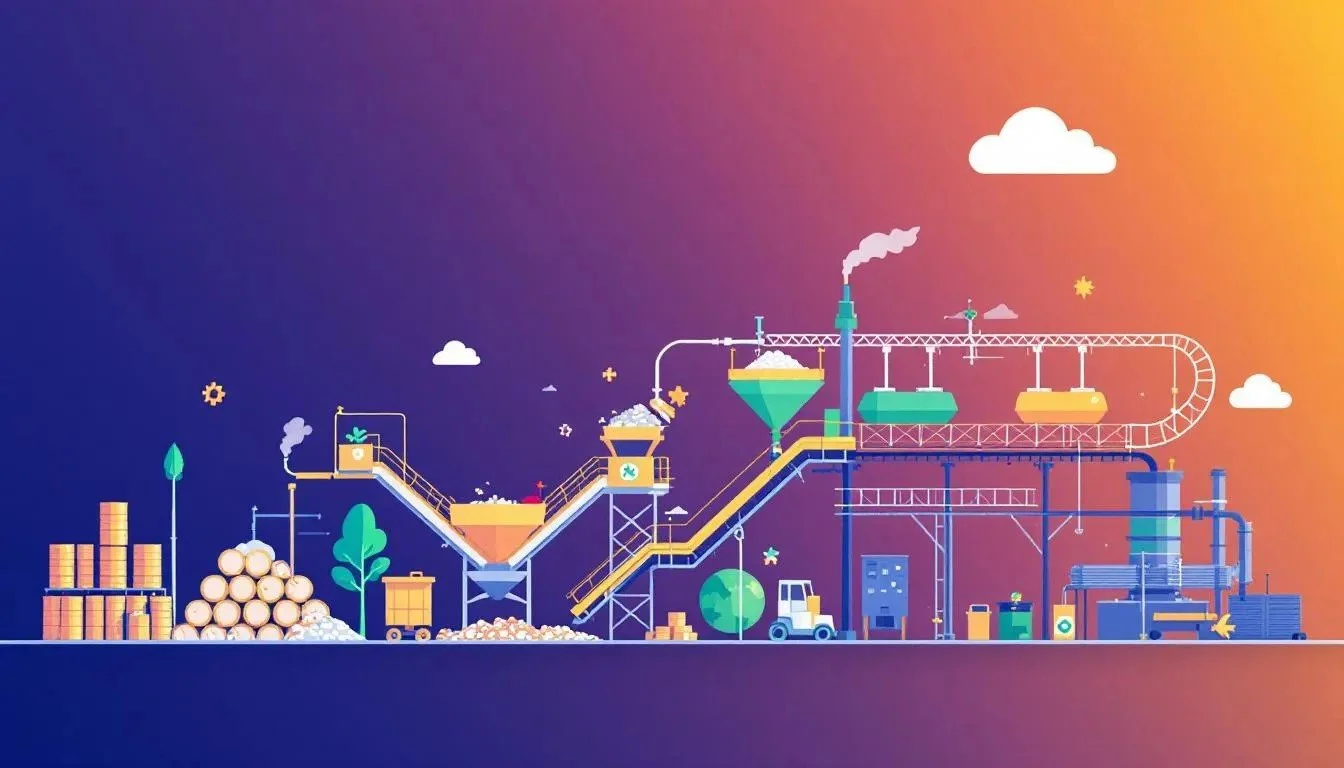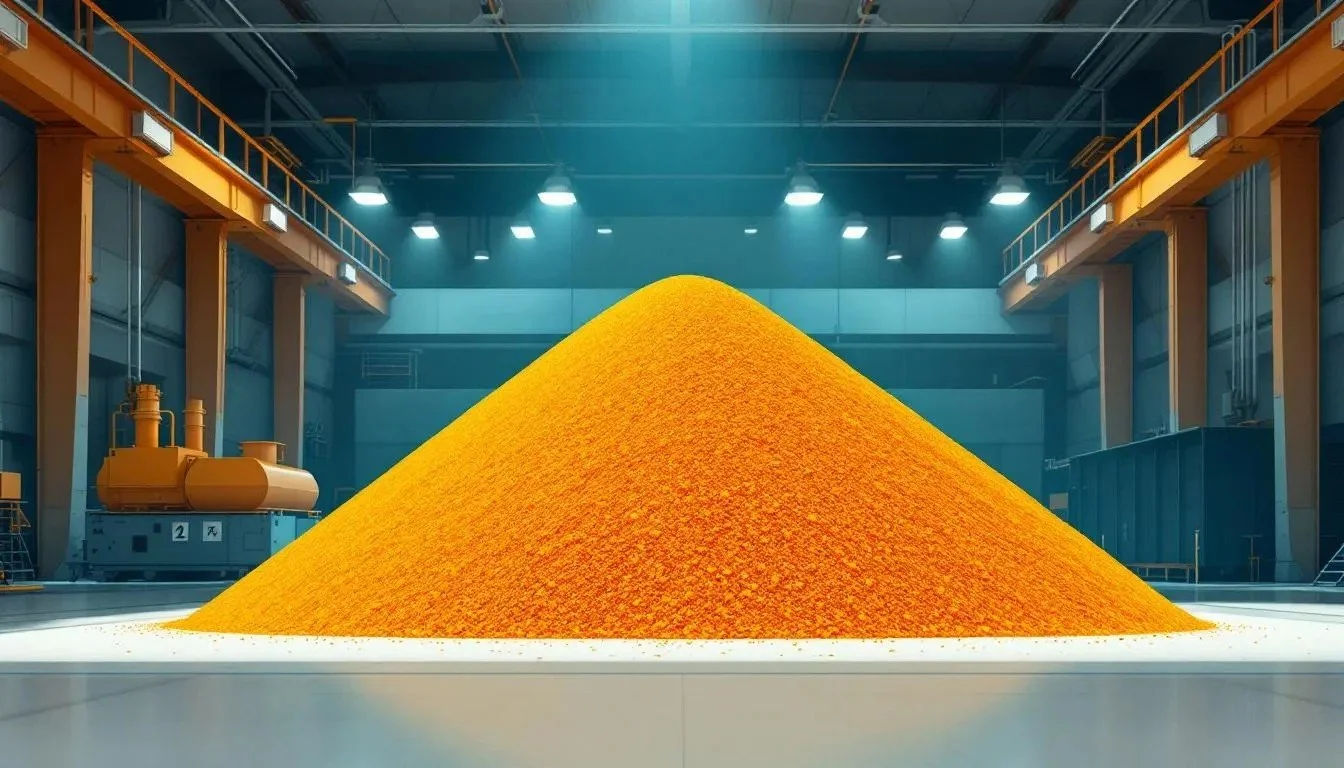Maximizing Efficiency with Industrial Materials Recycling Practices
Industrial materials recycling works when you focus on volume + preparation: separate the biggest streams, minimize contamination, and increase density (baling/densifying). Ship at full-truckload (FTL) cadence whenever possible to improve hauling costs, pricing, and outlet options.
Industrial materials recycling involves the reprocessing of waste from manufacturing operations—like metal scraps, baghouse dusts, and foundry sand—to conserve resources and minimize environmental impact. By implementing effective recycling practices, industries can achieve significant cost savings, reduce their carbon footprint, and support sustainability. This article will delve into different recycling methods, their benefits, and how they contribute to a more sustainable future.
Key Takeaways
Metal scraps recycling conserves resources and reduces emissions, contributing over $28 billion in economic impact annually in the U.S.
Recycling baghouse dusts and foundry sand supports waste reduction, lowers disposal costs, and enhances manufacturing sustainability.
Comprehensive recycling programs, including the management of off-spec products and other industrial waste streams, significantly improve operational efficiency and promote environmental protection.
Metal Scraps Recycling
Metal scraps recycling stands as a cornerstone in industrial recycling efforts, offering substantial environmental and economic benefits. Metals can be recycled indefinitely without losing their properties, making them an invaluable resource in sustainable manufacturing. Recycling metals like:
Aluminum
Steel
Copper conserves natural resources and reduces greenhouse gas emissions. Notably, recycling aluminum can save up to 95% of the energy required for its production from raw materials.
The economic impact of metal recycling is equally significant:
The U.S. alone generates approximately $28 billion through scrap material exports.
The sector supports over 500,000 jobs.
It contributes about $4.4 billion in state and local tax revenue annually.
It minimizes the environmental footprint by reducing the need for environmentally harmful mining operations.
Effective metal recycling involves separating metals from other waste materials and sorting them by type. This process ensures that valuable materials are efficiently recovered and repurposed, contributing to overall waste reduction and cost savings in new metal production. Integrating robust recycling practices allows industries to cut waste disposal costs and foster a more sustainable future.
Baghouse Dusts Recycling
Baghouse dusts, often overlooked in industrial recycling, represent a valuable resource when properly managed. Baghouse systems capture particulates from industrial air streams, which can then be processed for recycling. These recovered materials often include metals and other valuable components, reducing the need for virgin materials and enhancing resource recovery.
Recycling baghouse dusts requires carefully separating reusable materials from the waste stream, which lowers disposal costs and reduces landfill volume. Proper recycling practices preserve the inherent properties of the dust, enabling manufacturers to reuse materials without compromising quality.
The economic benefits of recycling baghouse dusts are substantial. By diverting material from landfills, manufacturers can significantly reduce their waste disposal expenses. This practice not only contributes to waste reduction but also supports sustainable manufacturing processes, making it a vital component of industrial recycling programs.
Foundry Sand Recycling
The foundry industry, generating around 100 million tons of waste foundry sand globally each year, faces significant waste management challenges. However, innovative sand reclamation systems offer a sustainable solution by significantly reducing the need for landfilling spent sand. These systems not only cut down on transportation costs but also enhance the quality of molds and casts through thermal sand reclamation technology.
Foundry sand can be beneficially reused in various applications beyond internal manufacturing processes, providing an effective way to reduce landfill waste and promote sustainability. Common beneficial uses include its incorporation into construction materials, such as concrete and asphalt, as well as its use in soil stabilization and reclamation projects. By diverting foundry sand from landfills and repurposing it in these ways, industries can lower disposal costs, reduce environmental impact, and support circular economy initiatives.
For more detailed information on the beneficial reuse of foundry sand and its environmental advantages, see Waste Optima's blog post on beneficial reuse.
Mill Scale Recycling
Mill scale, a byproduct of steel production containing 65-70% iron, is a valuable raw material for various industrial applications. Historically considered a nuisance, mill scale recycling has emerged as a crucial component of industrial waste management. Repurposing mill scale allows industries to cut waste and reduce reliance on traditional iron sources.
The recycling of mill scale involves its beneficial reuse as an iron feedstock in the production of alloys and other industrial applications, contributing to resource recovery and waste reduction. This practice not only minimizes the need for new raw materials but also supports sustainable manufacturing processes by diverting waste from landfills and promoting circular economy principles.
Including mill scale in recycling programs offers substantial economic and environmental benefits. By reducing landfill waste and recycling valuable materials in large quantities, industries can enhance their operational efficiency and promote a more sustainable future.
Off-Spec Products Recycling
Off-spec products, those not meeting quality standards, present a unique challenge in industrial waste management. Instead of discarding these products, recycling them can significantly contribute to waste reduction and sustainability. Tailored recycling programs help companies manage off-spec materials efficiently and reintegrate them into the production cycle.
Recycling off-spec products involves reprocessing the recycling materials to meet quality standards or repurposing them for alternative uses. This practice not only minimizes waste generation but also reduces waste disposal costs and conserves valuable resources, thereby reducing waste.
Including off-spec products in industrial recycling programs enhances overall recycling efficiency and supports sustainable manufacturing sector practices. Focusing on proper recycling and resource recovery enables industries to reap significant environmental and economic benefits.
Other Industrial Waste Streams
Beyond the common materials discussed waste streams, industries generate various other materials, including new materials that can be recycled. E-waste contains valuable materials like gold and silver as well as hazardous substances, making its recycling both economically beneficial and environmentally critical. Slags, sludges, and filter cakes, for instance, offer sustainable solutions for industrial waste management. These materials, often considered difficult to manage, can be efficiently processed and repurposed using advanced technologies like sliding bed furnaces.
Recycling these less-known waste streams involves separating and processing the materials to recover valuable components and reduce landfill waste. This practice supports resource recovery and minimizes environmental contamination, making it a crucial aspect of the recycling process in industrial processes and industrial recycling efforts, especially when dealing with hard to recycle plastics and e waste recycling.
Incorporating these additional waste streams into recycling programs helps many industries achieve comprehensive waste reduction and bolster sustainability efforts. This holistic approach to waste management underscores the importance of innovative recycling practices in industrial settings.
Enhancing Recycling Efficiency
Maximizing recycling efficiency is essential for achieving sustainable industrial operations. Partnering with professional recycling facilities ensures materials are recycled responsibly and efficiently. Regular training sessions and informative programs can significantly increase employee participation and awareness, leading to more effective recycling efforts.
Implementing waste audits helps organizations understand the types and volumes of waste generated, which is crucial for optimizing recycling practices. Balancing the number and size of recycling containers, along with using balers and compactors, can further enhance recycling efficiency by optimizing space and reducing the frequency of waste pickups.
Proactively preparing for the disposal of hard-to-recycle materials can save time and improve operational efficiency. Focusing on these strategies helps industries cut costs associated with waste disposal and raw material purchasing, promoting a more sustainable future and helping to reduce waste.
Regulatory Compliance and Environmental Protection
Regulatory compliance is critical for industrial recycling practices, ensuring that businesses meet environmental standards and avoid legal issues. The Resource Conservation and Recovery Act (RCRA) mandates the management of hazardous waste from generation to disposal, protecting human health and the environment. Compliance with these regulations helps businesses avoid penalties and supports sustainable practices.
Recycling practices also play a crucial role in preventing environmental contamination and promoting environmental protection. By adhering to regulatory standards and implementing effective recycling programs, industries can significantly reduce environmental impact and contribute to a more sustainable future.
The Role of Recycling Programs
Effective recycling programs are essential for maximizing recycling efficiency and sustainability in industrial settings. Employee compliance can be enhanced through effective training and strategically placed plastic containers. Training programs that teach proper sorting and waste management techniques are crucial for enhancing workplace recycling efforts.
Integrating recycling education into onboarding processes establishes sustainable habits among new employees from the outset. Utilizing multiple communication channels, such as emails and physical signage, reinforces recycling practices and keeps employees informed.
Reducing contamination in recycling bins can significantly improve the overall effectiveness and profitability of a recycling program. Together, effective employee education and reducing contamination create a robust recycling program that maximizes efficiency and sustainability.
Benefits of Industrial Materials Recycling
Recycling industrial materials offers numerous benefits:
Environmental: significantly reduces waste sent to landfills, conserving natural resources.
Economic: improves operational efficiency, allowing businesses to focus on growth.
Operational: companies implementing effective recycling training can report up to a 50% reduction in recyclable materials.
Recycling helps conserve energy consumption and natural resources by decreasing the demand for new raw materials. The recycling of baghouse dusts, for example, contributes to a circular economy by repurposing waste materials back into the production cycle, which ultimately leads to less energy usage. This practice supports sustainable operations, and energy production is enhanced as recycling reduces environmental impact.
Adopting sustainable recycling practices can enhance a company’s public image and provide a competitive advantage in the market while helping to achieve sustainability goals. Recognition programs that celebrate excellent recycling practices can boost employee participation and foster a culture of environmental responsibility.
Summary
In conclusion, industrial materials recycling is crucial for sustainable industrial operations. From metal scraps and baghouse dusts to foundry sand and mill scale, recycling these materials offers significant environmental and economic benefits. Many industries recycle materials to contribute to a closed-loop economy, minimizing waste and promoting sustainability. By enhancing recycling efficiency, ensuring regulatory compliance, and implementing effective recycling programs, industries can achieve substantial waste reduction and operational efficiency.
The importance of recycling cannot be overstated. It conserves natural resources, reduces environmental impact, and supports a more sustainable future. By adopting innovative recycling practices and fostering a culture of sustainability, industries can contribute to a healthier planet and a more prosperous economy.
Ready to optimize your industrial recycling efforts? Contact Waste Optima today to learn how our tailored solutions can help your business reduce waste, cut costs, and advance your sustainability goals. Visit our Contact Us page to get started.
Frequently Asked Questions
What are the benefits of recycling metal scraps?
Recycling metal scraps significantly conserves natural resources and reduces greenhouse gas emissions while also creating economic opportunities and supporting jobs. It's a crucial step toward a more sustainable future.
How does baghouse dust recycling benefit manufacturers?
Baghouse dust recycling significantly benefits manufacturers by lowering waste disposal costs and enhancing sustainability efforts through the reduction of landfill waste and the recovery of quality materials. This practice not only improves operational efficiency but also aligns with eco-friendly goals.
What is the significance of foundry sand recycling?
The significance of foundry sand recycling lies in its ability to minimize landfill waste, lower transportation costs, and improve the quality of molds and casts, ultimately fostering sustainable manufacturing practices.
How can industries enhance recycling efficiency?
Industries can significantly enhance recycling efficiency by collaborating with professional recycling services and conducting thorough waste audits. Additionally, ensuring appropriate container sizes and training employees on proper recycling practices are vital steps.
Why is regulatory compliance important in industrial recycling?
Regulatory compliance is crucial in industrial recycling as it ensures adherence to environmental standards, mitigates legal risks, and prevents contamination. Emphasizing compliance supports sustainable practices and aligns industry operations with environmental goals.
Related services:
Solutions Overview - Plastics - Surplus Inventory - Paper - Organics





